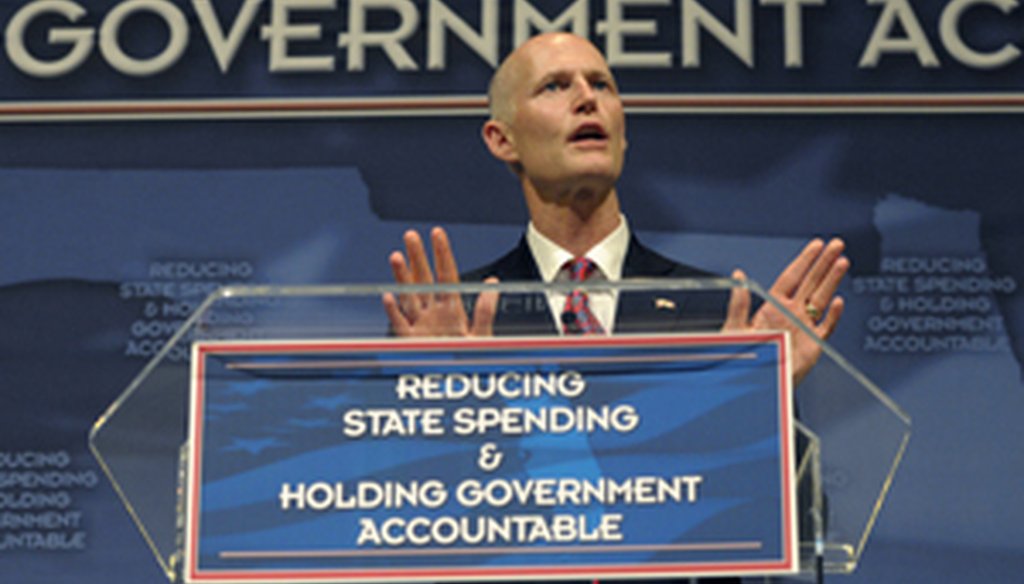Get PolitiFact in your inbox.

Florida Gov. Rick Scott announces his budget plan in Eustis on Feb. 7, 2011.
Florida Gov. Rick Scott pushed a lot of buttons with his first state budget proposal, released Feb. 7, 2011.
A governor's budget is a good barometer of his priorities, and Scott used the chance to promote his cost-cutting business focus and his intention to take a different approach to government.
PolitiFact Florida has been tracking Scott's campaign promises on the Scott-O-Meter, creating an up-to-the-minute and evolving report card on Scott's administration. We're rating each promise on a six-point scale: Not Yet Rated, In the Works, Stalled, Promise Broken, Compromise and Promise Kept. With the budget, Scott addressed a number of his promises.
Even the budget format was new. Scott promised to prepare two-year budgets to bring a longer-term view to government, and that's what he did. We rated that one Promise Kept. Traditionally, the budget is year-to-year only, and it's not clear yet how the Legislature will handle this approach. Lawmakers are required to pass only an annual budget, so they may review the two-year figures but stick to just the 2011-12 numbers when it's time to vote.
Here's how some of his other promises fared.
Businesses
Scott vowed throughout the 2010 campaign to eliminate the corporate income tax as a way to build private-sector jobs. This budget doesn't propose elimination, but it takes two steps in that direction and we rated it In the Works. First, he called for a cut in the 5.5 percent tax rate to 3 percent in 2011-12, and then another half-point to 2.5 percent in 2012-13. Although it's not in this budget, the documents he prepared to explain his budget takes the tax down again in 2013-14, to just 2 percent. Today, the tax represents about 9 percent of the state's general revenue, so lawmakers will have to grapple with this proposal while facing a budget shortage of at least $3 billion.
In a second boost for businesses, Scott said he would lower the cost to employers of the state's unemployment program. He proposes to do that by cutting the number of weeks (to 20 from 26) that a jobless worker can receive benefits. He also wants to make it more difficult for the unemployed to qualify for benefits. With legislative committees already discussing plans to make it easier to fire workers, easier to challenge whether they are eligible for unemployment and requiring them to work in community service, we moved this promise to In the Works as well.
Taxes
On a promise to reduce the statewide property tax required for local schools by 19 percent, we rated Scott's budget proposal a Promise Broken. Although his charts present the cut as nearly $1.1 billion, the actual budget shows it is only about half that, at $572 million. Scott's budget chief, Jerry McDaniel, later told senators that it's only about an 8 percent cut.
We also looked at a second part of that promise, to reduce property taxes "so that not $1 is shifted away from our schools." After Scott told reporters that he didn't say that during the campaign, the Truth-O-Meter rated his statement False. We have him on tape just four days earlier talking about schools, saying "my commitment is to make sure the money that they've received they'll get again." But his proposal would cut between $3.3 billion and $4.8 billion and trim per-pupil funding by about 10 percent.
State workers
State employees took some hits in the budget proposal. Scott vowed to cut the workforce by 5 percent and save $300 million, and we rated that one In the Works. His proposed first-year cut, for the fiscal year starting July 1, 2011, is 6.85 percent including elimination of more than 2,000 vacant positions. In his second year, he would cut another 3.5 percent, a two-year total of more than 12,700 state positions.
The Scott-O-Meter also looked at changes proposed in health care benefits for state workers, because Scott promised to bring those costs in line with the U.S. average. He would require higher-ranking employees to pay the same rates for coverage as the front-line workers, and he would cap the amount of health insurance coverage at $5,000 for both individual and family coverage. Lawmakers will have to weigh that change, and we rated it In the Works for now.
In addition to reviewing the budget numbers, we looked at the charts that Scott's staff produced to explain the budget. One in particular caught our eye, claiming that the $4.1 billion in lower taxes and fees he proposed amounted to a $540 savings for each Florida household in the next two years. But just over half the cuts are for business taxes, not households. When we did the math, we found the savings is just $267 per household for two years. We rated that claim Barely True.
Prison food, college grants
One place Scott proposed spending more money is on a Department of Corrections program to use inmates to grow food, which is then included in their meals. The edible crops program -- broccoli, cabbage, cantaloupe, watermelon and other items -- would get a one-time $2.5 million increase to improve irrigation and farming equipment. We labeled this one In the Works, because Scott also proposed other cuts of $5.3 million in inmate food costs.
Finally, for prospective college students, Scott promised to preserve the Florida Resident Access Grants, called FRAG, which provide $2,000 to $2,500 a year to tens of thousands of residents who want to attend a private state school. We found in his budget proposals that Scott is keeping the grants, and in fact is setting aside more money for them than his predecessor, Gov. Charlie Crist, did in the current budget. This one, too, is In the Works.
PolitiFact Florida will continue regular updates on Scott's promises. If you know of more campaign promises we should be tracking on the Scott-O-Meter, please e-mail us at [email protected].
UPDATE: We updated another campaign promise on the Scott-O-Meter after this article was posted, and include it here:
Scott is pushing 'accountability budgeting' for all state agencies. He asked all agencies to review their current performance measures and suggest new ones that show how expenditures are justified by the outcomes. If they do and it saves money, Scott proposes to let the agency keep up to half of its unspent funds for bonuses, training or improved technology. But if they don't measure up, then agency programs may be eliminated, outsourced or restructured. Pending legislative action, this promise too is In the Works.
Our Sources
See individual Truth-O-Meter and Scott-O-Meter items.































